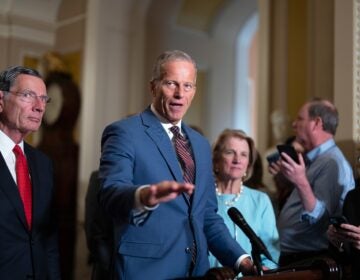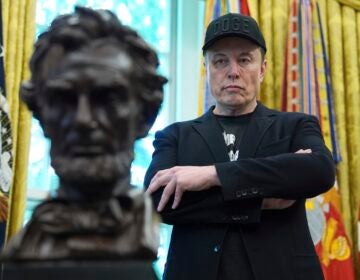The play’s the thing to spark a dialogue
This just in: It’s hard to talk about race.
But a hopeful update: It can be done.
Particularly when you get an assist from a Pultizer Prize-winning playwright. David Mamet’s play, Race, is on stage now at the Philadelphia Theatre Co. (running through Feb. 20)
It’s a spare piece, just four actors, one simple set. Still, it is one tangled, double helix of a drama. It’s about a pair of law partners, one white, one black, defending a rich white guy accused of raping a black woman.
Once you’ve seen it, you want to talk it over. So the theater bravely decided to give its playgoers the chance. Last Monday, about 100 people braved whistling winds to come to the theater on the Avenue of the Arts to take part in a dialogue.
The event was co-sponsored by WHYY. Working with the Penn Project for Civic Engagement and NewCORE (the New Conversation on Race and Ethnicity), I helped design the process and train the moderators who led the seven small-group discussions.
The breakout group I helped moderate had about 16 people, evenly split between black and white.
I’ve been leading dialogues about race for a while. I have not found any magic path. But one thing I do know: If you want to move beyond kumbaya platitudes or bristly silences, it’s a good idea not to start out talking directly about race.
On this night, we started out talking about the play – asking those around the circle which character they most identified with. Not which one they liked most, or thought was the best person. Which one they identified with.
The answers were fascinating: Several black men said they identified with Jack, the cynical white lawyer. (So did I.) Several white women identified with Susan, the young black associate who is treated dismissively by her male senior partners. Several black women identified with characters mentioned but never shown on stage. “I know what’s it’s like to be invisible,” one said.
It was a lively, honest exchange. And it left me depressed. The black-white chasm of perception among even people of good will remains vast.
Many whites, believing they try to be enlightened about race, think the goal is for things in our society to stop being about the color of one’s skin.
This notion just summons bitter laughs from blacks around the circle. For a person with black skin in a white world, they say, every day is about race, whether they want it to be or not. Always has been, always will, in their view, and anyone who believes otherwise is trying to fool themselves or someone else. The change they’d like to see in the eternal back-and-forth, as best I can tell, is for the ground rules to change so that sometimes, in some circumstances, at least, they have the upper hand.
When one white woman told a tale of changing race attitudes within her family, one black man, a most genial fellow who had contributed rich insights throughout the evening, pretty much snapped at her, “You can say all that and feel good about things, but I still can’t get a cab.”
The woman struggled to mask her pain and surprise, but it was evident.
Still, I seek ground upon which to construct hope. And here it is:
Later, this same guy made a point of turning back to that woman and softening his comment: “It’s true; sometimes we blacks tend to be pessimistic. That’s because you whites tend to be way too optimistic about the progress that’s been made. So we go the other way, just so you don’t delude yourselves. But still, it’s true, we can be too pessimistic.”
When people ask me what’s the point of yet another dialogue about race, that’s the moment I’ll mention.WURD-AM, the black talk radio station that is a NewsWorks partner, held its own forum event on the play this Saturday. In the coming week, look for more reports on these events from the moderators who led our Monday dialogues and from the WURD folks this week in the Engage section of NewsWorks on the Sixth Square page.
You’ll also see reports on dialogues we convened as part of Martin Luther King Jr. Day of Service that were attended by more than 200 people at Girard College and South Philadelphia High School.
Also here’s a link to a column that Annette John-Hall of The Inquirer wrote about Monday’s event at Philadelphia Theatre Co.
WHYY is your source for fact-based, in-depth journalism and information. As a nonprofit organization, we rely on financial support from readers like you. Please give today.




